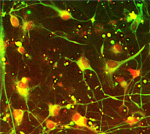
Somatic cell reprogramming technology enables researchers to build disease models by generating iPSC lines from patient samples, to differentiate them into targeted primary cells, and manifest disease symptoms in vitro.
So far, many disease models for CNS disorders, such as Alzheimer’s disease (AD), Parkinson’s disease (PD), Autism, Schizophrenia, and Amyotrophic Lateral Sclerosis (ALS), have been generated using this strategy. However, there is a common limitation for disease models solely based on patient‐derived iPSC lines: the mechanism of action of genetic mutations underlying a disease is often complicated by diverse genetic backgrounds from patient to patient since most genetic mutations associated with CNS disorders have in general small effect on the disease phenotype.
To meet researchers’ needs for disease‐specific isogenic controls, we have developed a series of knockout iPSC lines that mimic loss of function of genes associated with various CNS disorders. These isogenic knockout iPSC lines and their derivatives offer novel tools for controlled experiments to decipher functionality of each disease‐associated gene, and thus the mechanism underlying the disease.
Features and benefits
- The panel covers a wide range of major CNS disorders
- Matched set of wild type, monoallelic (heterozygous) KO and biallelic (homozygous) KO in the same genetic background allows accurate analysis of gene function and their role in underlying diseases
- Can be used as controls for disease modeling along with patient‐derived iPSC lines
- Can be used for drug target discovery for CNS disorders
List of isogenic knockout iPSC lines and their derivatives
NB: Neurons, Dopaminergic Neurons, Astrocytes and Oligodendrocytes can be purchased (not the iPS lines)
Characterization example: Knock‐out line for APOE4, a gene associated with Alzheimer’s disease
Don’t hesitate to contact me if you are interested in such models… or if you’d like to learn more.
[contact-form to=’jean-francois.tetu@tebu-bio.com’ subject=’Isogenic KO models for CNS disorders’][contact-field label=’Name’ type=’name’ required=’1’/][contact-field label=’Email’ type=’email’ required=’1’/][contact-field label=’Comment’ type=’textarea’ required=’1’/][/contact-form]





